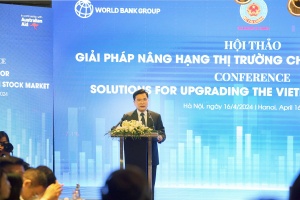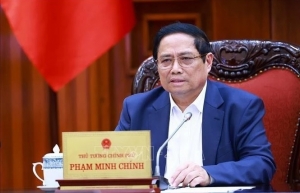Strong institutions shield emerging markets from US monetary shocks
 |
| Donghyun Park (left) and Irfan A. Qureshi from ADB |
The global impact of US monetary policy significantly affects capital flows and credit growth in emerging markets, highlighting the importance of macroeconomic fundamentals and institutional quality in determining resilience during different monetary cycles.
The US dollar continues to reign supreme. The dollar dominates international trade and financial transactions, and the foreign exchange reserves of central banks.
As such, US monetary policy still drives global financial cycles, impacting global capital flows and credit growth. Dollar dominance ultimately limits the policy choices of financially integrated emerging markets.
The global influence of US monetary policy was especially visible during the seven years of easing from 2007-2014 induced by the global financial crisis and its aftermath. This was followed by 4.5 years of tightening that was kicked off by the 2013 ‘taper tantrum’.
Subsequently, three years of easing (2019–2022), largely induced by the Covid-19 pandemic, eventually led to a major tightening beginning in February 2022 as a delayed reaction to rapidly rising inflation in the United States.
Interest rates in the US and other advanced economies have breached levels not seen since the global financial crisis of 2008-2009.
US monetary policy shifts have global repercussions, so the capital markets in emerging economies are often vulnerable to destabilising flight-to-quality outflows during periods of heightened uncertainty.
They are also vulnerable to volatile search-for-yield inflows during periods of low returns in the US.
Large inflows were observed when the US Federal Reserve's massive monetary easing pushed the federal funds rate close to zero following the global financial crisis.
At a broader level, these episodes placed increasing pressure on the macroeconomic outlook of emerging markets and raised their risk profile.
They also impacted emerging market currencies, debt repayments, and capital flows.
For instance, 2023 saw many currencies in developing Asia depreciate substantially versus the US dollar due to aggressive tightening by the Fed.
A natural question that arises is why some emerging markets are more resilient and/or less vulnerable to US monetary policy cycles, an issue examined in the study "The Performance of Emerging Markets during the Fed’s Easing and Tightening Cycles: A Cross-Country Resilience Analysis" by Joshua Aizenman, Donghyun Park, Irfan A. Qureshi, Gazi Salah Uddin and Jamel Saadaoui, all ADB experts.
One approach is to empirically assess whether macroeconomic variables such as debt levels and institutional variables like degrees of corruption can explain an emerging market’s resilience during each cycle.
The study also takes a holistic approach to measuring emerging market resilience by focusing on the bilateral exchange rate against the US dollar, exchange rate market pressure, and the country-specific Morgan Stanley Capital International Index (MSCI).
In addition, the role of policy factors such as exchange rate regime type and inflation targeting were also examined.
At the broadest level, the existing research finds that macroeconomic and institutional variables are indeed significantly associated with emerging market performance. Furthermore, the determinants of resilience differ during tightening versus easing cycles, and the quality of institutions matters even more during difficult times.
We found that cross-country differences in ex-ante macroeconomic fundamentals and institutional variables can help explain the differences in performance and resilience of a large cross-section of emerging markets during different US monetary cycles.
These determinants differ during tightening versus easing cycles. The significance of ex-ante institutional variables increased during the monetary cycles triggered by the global financial crisis and the taper tantrum. This suggests that strong institutions matter more during difficult times.
To address these issues, emerging market policymakers should understand that macroeconomic variables such as the amount of international reserves, the current account balance, and inflation are all important determinants of an emerging market’s resilience to US monetary policy swings.
This reinforces the conventional wisdom that strong fundamentals protect emerging markets in the face of large external shocks.
In particular, policymakers should continue to focus on vulnerable sovereigns with large external debt obligations and economies with highly leveraged property markets and weaknesses in capital markets that are typically challenged by the changing interest rate landscape.
The borrowing costs of these economies might rise if there is a sudden deterioration in global financial conditions, further worsening their fragile fundamentals.
To safeguard their economies against the volatility induced by US monetary policy, emerging market policymakers must prioritise strengthening macroeconomic fundamentals and institutions.
This will help ensure long-term financial stability and foster sustained economic growth amidst the challenges posed by global financial fluctuations.
* Donghyun Park, economic advisor (Strategic Knowledge Initiatives), ADB Office of the Chief Economist, and director general, Economic Research and Development Impact Department
* Irfan A. Qureshi, economist, ADB Macroeconomics Research Division, Economic Research and Development Impact Department
 | A different approach for monetary policy adjustments Data from the State Bank of Vietnam showed that after a 5.5 per cent increase in money supply in 2022, there was a 13 per cent increase last year. Le Hoai An, a banking consultant and trainer at Integrated Financial Solutions, talked to VIR’s Hong Dung about the current money supply and velocity. |
 | Vietnam’s road to emerging market status The Ministry of Finance (MoF) started asking for feedback at the end of March on a draft circular aimed at upgrading Vietnam's stock market to 'emerging' status. |
 | PM chairs meeting on fiscal, monetary policy management Prime Minister Pham Minh Chinh chaired a meeting in Hanoi on May 16 with ministries and agencies to discuss the coordination of fiscal and monetary policies aimed at maintaining macroeconomic stability, controlling inflation and promoting growth. |
What the stars mean:
★ Poor ★ ★ Promising ★★★ Good ★★★★ Very good ★★★★★ Exceptional
 Tag:
Tag:
Related Contents
Latest News
More News
- IP alterations shape asset strategies for local investors (January 22, 2026 | 10:00)
- 14th National Party Congress: Vietnam - positive factor for peace, sustainable development (January 22, 2026 | 09:46)
- Japanese legislator confident in CPV's role in advancing Vietnam’s growth (January 22, 2026 | 09:30)
- 14th National Party Congress: France-based scholar singles out institutional reform as key breakthrough (January 21, 2026 | 09:59)
- 14th National Party Congress: Promoting OV's role in driving sustainable development (January 20, 2026 | 09:31)
- 14th National Party Congress affirms Party’s leadership role, Vietnam’s right to self-determined development (January 20, 2026 | 09:27)
- Direction ahead for low-carbon development finance in Vietnam (January 14, 2026 | 09:58)
- Vietnam opens arms wide to talent with high-tech nous (December 23, 2025 | 09:00)
- Why global standards matter in digital world (December 18, 2025 | 15:42)
- Opportunities reshaped by disciplined capital aspects (December 08, 2025 | 10:05)




























 Mobile Version
Mobile Version